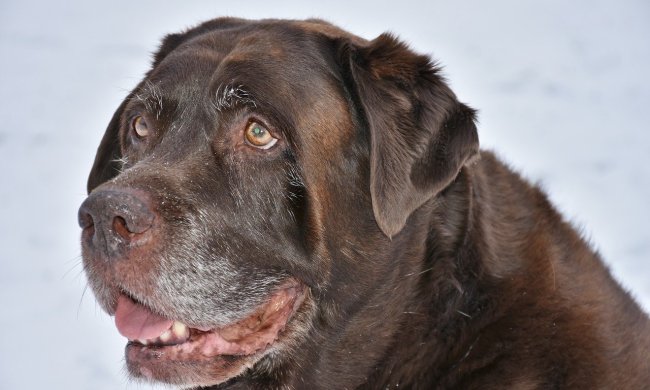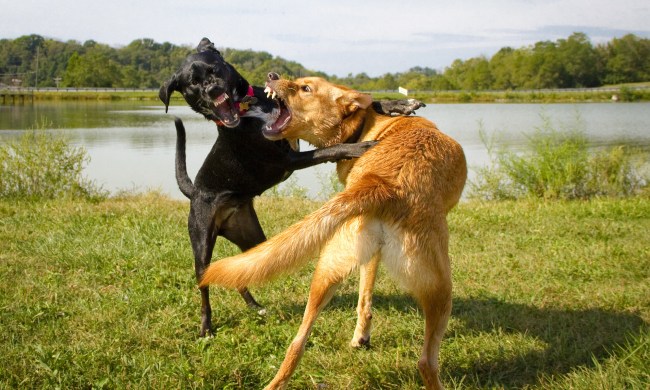
Did you know that dogs and humans have similar brain structures? Just like us, dogs experience emotions like happiness, anger, excitement, love, and disgust. However, a dog’s brain is more similar to that of a human toddler than that of an adult, meaning their range of emotions is somewhat limited. Your dog’s expressions can run the gamut from a playful smile to an aggravated sneer, but some behaviors leave even the most seasoned pet parents scratching their heads.
Have you ever wondered what dog teeth chattering means? There are several causes of dog jaw chattering. Some are simple and easily remedied — such as extreme emotions — and others require a trip to the vet. Here’s what it means if your dog’s teeth are chattering.
Why do dogs chatter their teeth?

As a pet parent, you get to know your dog’s personality quirks inside and out. You know what his favorite toy is, his preferred type of food, and his go-to place to sleep. It’s understandable to feel alarmed if your pup exhibits a behavior he’s never shown before, especially one as unexpected as chattering teeth. But rest assured — there are a few perfectly benign reasons your pup may be chattering his teeth.
Dogs’ teeth chatter when it’s cold outside
Just because your pooch is wearing a fur coat doesn’t mean he’s always toasty and warm. Similar to our response to cold weather, a dog’s teeth may begin to chatter when the temperature dips. Once it gets cold, try not to leave your dog outside for long periods. If you absolutely have to leave your dog out during the day, or if you have a livestock guardian dog, make sure he has access to a barn or heated dog house so he can warm himself up when needed.
Your pup is excited about something
Have you ever seen a cat’s teeth chatter? It often happens when a frisky feline spots a bird or a lizard through a window, and it’s usually accompanied by a chirping sound. While this behavioral quirk/hunting instinct is less common in dogs, some pups can work themselves up into such a state that they can’t stop their teeth from chattering with excitement. If your dog’s teeth are chattering immediately after playtime, don’t be alarmed. Your pooch is fine; he just can’t contain his excitement.
Your dog is taking in a scent
Your dog’s olfactory system is a powerhouse, but did you know your pooch has a secondary scent-collection system? This system is located in your pup’s mouth. Your dog’s teeth may chatter when this secondary scent-collection system is activated, and he’ll most likely drool a lot, too. Intact male dogs show this behavior most often, but it can occur among any dog.
Chattering can be a sign of stomach upset or nausea
Some dog owners notice their dog’s teeth chattering shortly before vomiting or even when they’re showing other signs of stomach upset. This may be the case if your dog refuses to eat or starts to eat grass, but most of the time, gastrointestinal upset is nothing to lose sleep over.
What can dog teeth chattering be a sign of?

In many instances, your dog’s teeth chattering is nothing to be concerned about. Unfortunately, not all reasons are benign. Some are more concerning and require a trip to the vet as soon as possible. Rarely, teeth chattering teeth may be a symptom of the following health problems.
Abscessed tooth
If your pooch has an abscessed tooth, he may chatter his teeth to relieve some of the pressure caused by infection and inflammation. Other symptoms to look out for include facial swelling, increased drooling, loss of appetite, and bad breath.
Periodontal disease
Periodontal disease, a progressive disease caused by the buildup of bacteria along the gum line, affects almost 90% of all dogs by the time they reach two years of age. Bloody gums, drooling, loss of appetite, and teeth chattering may indicate that your pup is suffering from periodontal disease. You can help prevent this by staying on top of your dog’s regular vet and dental checkups.
Anxiety
Just like humans, dogs can suffer from anxiety. Incessant barking, pacing, panting, teeth chattering, and chewing on household items are all good indicators that your dog may have anxiety. Speak to your vet about the possibility of using behavioral training or medication to help alleviate your dog’s symptoms if you think this may be the case.
Seizure disorder
Some neurological conditions, such as epilepsy, cause dogs to chatter their teeth during seizures. In fact, epilepsy is much more common in dogs than it is in humans. Another possibility is focal motor seizures, which are centered in your dog’s mouth and ultimately won’t cause your pup much trouble. Seizures must be diagnosed by a veterinarian, but you can help by keeping your dog safe during seizures and recording a video for your vet — only if you’re able!
Canine multiple system degeneration
In the beginning stages of a hereditary disease called canine multiple system degeneration, your dog’s teeth may chatter. The disease is progressive and may cause difficulty standing and walking in later stages. While there is no cure for this disorder, which mainly affects Kerry Blue Terriers and Chinese Crested dogs, your vet can prescribe medication to help alleviate the symptoms.
What to do about a dog’s teeth chattering

It can be shocking, and maybe even alarming, to see your dog chatter its teeth for the first time, but what exactly should you do about it? Ultimately, your actions depend on what could be causing the behavior, so first, you need to try to figure out what’s going on. Ask yourself whether circumstances meet the criteria for any of the benign causes of chattering, such as excitement or scent tracking. If you were just out for a walk or are somewhere especially chilly, it’s likely a normal reaction.
However, you’ll want to keep a closer eye on your pup if the chattering doesn’t stop within a few minutes. Of course, please waste no time getting help if you suspect any kind of emergency, like an unexpected seizure. You may narrow down what’s going on based on other symptoms, such as drooling or pawing at the mouth, to indicate pain, but if you are truly stumped, it may be time to call the vet.
While many causes for your dog’s chattering teeth are harmless, others require veterinary intervention. If your pup isn’t cold and you haven’t finished a walk or an epic play session in the backyard, we recommend taking your pup to the vet at the first sign of teeth chattering. Your dog’s health is your top priority, and most cases of teeth chattering can be treated easily with prompt attention.



